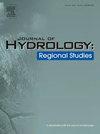Baseflow characteristics and drivers in headwater catchment of the Yellow River, Tibetan Plateau
IF 4.7
2区 地球科学
Q1 WATER RESOURCES
引用次数: 0
Abstract
Study area
The headwater catchment of the Yellow River (HCYR) (95°90′–103°42′E, 32°16′–36°13′N) is located on the northeast of the Tibetan Plateau, a presentative high-cold region catchment, China.
Study focus
HCYR serves as the primary water supply during the dry season in downstream of the Yellow River Basin. Herein, we applied linear regression and the Bernaola-Galvan heuristic segmentation algorithm to identify the baseflow trends and abrupt changes. Four baseflow signatures (baseflow index (BFI), seasonal ratio (SR), concave index (CI), and slope of baseflow duration curve (SBDC)) were used to investigate the characteristics of baseflow changes and the drivers quantitatively.
New hydrological insights for the region
The main findings are: (1) the baseflow generally exhibited an increasing trend (R2 > 0.35, p < 0.1), (2) baseflow variation has an apparent spatiality, and it shows a more pronounced change in the middle part than the upper and lower parts, and (3) precipitation, sunshine hours, soil moisture and evapotranspiration were the controlling factors on the baseflow characteristics. These findings provide a deeper insight into baseflow behavior and drivers in high-cold regions, which are vital for ecosystem health, water resource safety and management in critical headwater catchments.
青藏高原黄河源头流域的基流特征和驱动因素
研究区域黄河源头集水区(95°90′-103°42′E,32°16′-36°13′N)位于青藏高原东北部,是中国目前的高寒地区集水区。研究重点黄河源头集水区是黄河流域下游枯水期的主要水源地。在此,我们采用线性回归和 Bernaola-Galvan 启发式分割算法来识别基流趋势和突变。利用基流指数 (BFI)、季节比 (SR)、凹指数 (CI) 和基流持续时间曲线斜率 (SBDC) 等四种基流特征,定量研究了基流变化的特征及其驱动因素:(1) 基流总体上呈上升趋势(R2 为 0.35,p 为 0.1);(2) 基流变化具有明显的空间性,且中段变化比上、下段更明显;(3) 降水、日照时数、土壤水分和蒸散作用是基流特征的控制因素。这些发现有助于深入了解高寒地区的基流行为和驱动因素,对关键源头流域的生态系统健康、水资源安全和管理至关重要。
本文章由计算机程序翻译,如有差异,请以英文原文为准。
求助全文
约1分钟内获得全文
求助全文
来源期刊

Journal of Hydrology-Regional Studies
Earth and Planetary Sciences-Earth and Planetary Sciences (miscellaneous)
CiteScore
6.70
自引率
8.50%
发文量
284
审稿时长
60 days
期刊介绍:
Journal of Hydrology: Regional Studies publishes original research papers enhancing the science of hydrology and aiming at region-specific problems, past and future conditions, analysis, review and solutions. The journal particularly welcomes research papers that deliver new insights into region-specific hydrological processes and responses to changing conditions, as well as contributions that incorporate interdisciplinarity and translational science.
 求助内容:
求助内容: 应助结果提醒方式:
应助结果提醒方式:


